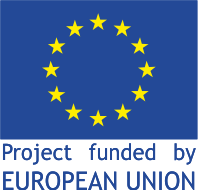Common borders. Common solutions.
LeNetEco 2
Establishment of Learning Network for the consolidation effort of joint environmental control and monitoring in the Black Sea Basin 2
Project Number BSB-1088
Install the mobile application to fight pollution
Programme Framework
Programme Specific Objective
Promote coordination of environmental protection and joint reduction of marine litter in the Black Sea Basin
Programme Priority
Priority 2.1 Improve joint environmental monitoring
The overall LeNetEco project objective is joint effort consolidation and society involvement in the BSB countries by environmental control and monitoring of its rivers deltas improvement.


1
Provide access to educational resources, knowledge and information in the field of environmental protection by establishing an environmental training and informing e-resource.

2
Improve cultural and educational potential of BSB countries citizens in environmental protection sphere by ecology training program development.

3
Strengthen collaboration and knowledge and information accumulation for ensuring a stable function of LeNetEco platform therefor giving possibility to other countries and organizations to use and evaluate it.
LeNetEco 2Partnership
Lead Partner:
Danubius University of Galati
800654, Romania, Galati, 3 Galati boulevard
E-mail: luciantilea@univ-danubius.ro
Project partner 2:
Agency of Sustainable Development and
European Integration "Lower Danube
Euroregion"
68600, Ukraine, Izmail, 58 Kishinivska str.
E-mail: asdei.euroregion@gmail.com
Project partner 3:
Odessa National Polytechnic University
65044, Ukraine, Odesa, 1a Shevchenko ave
E-mail: nataliyamitrofanova3@gmail.com
Project partner 4:
University “Prof. D-r Asen Zlatarov”
8010, Bulgaria, Burgas, 1 “Prof. Yakimov” boulevard
E-mail: imarkovska@btu.bg
Project partner 5:
Association of Cross Border Cooperation
“Lower Danube Euroregion”
800119, Romania, Galati, 64 Eroilor str.
E-mail: actedj@gmail.com
Project partner 6:
Ecological Counseling Center Cahul
3900, R. Moldova, Cahul, 7 B.P. Hasdeu str.
E-mail: cce_cahul@yahoo.com
Expected results
1. The main and most important result of the project is the LeNetEco platform which consists from 3 independents but united by the common aim of the parts.
Firstly, LeNetEco platform will significantly reduce the problem of insufficient knowledge in the environmental monitoring and protection field, of BSB countries citizens, especially for young people.
Secondly, it will be a place where to publish the Black Sea Basin Deltas environmental information.
Thirdly, it will allow united efforts of different social citizens groups and organizations of BSB countries in order to control the state of the environment.
Fourthly, its creation will promote territorial cooperation of active youth groups, local authorities, ecology laboratories, researchers, NGOs.
Fifthly, LeNetEco platform and all its parts will also be used and developed after the end of the project, i.e. as a long term result of the project.
2. Next, but with no less importance in achieving the overall project goal is the creation of an environmental protection and monitoring environmental situation training program. This program consists of 5 training courses directed to selected target groups.
3. Another project result is participants training divided in 5 pilot groups taking place in the projects partner countries with a total number of 960 people, 600 of whom are pupils and students.
4. The up most important result is the availability of an online version of the curriculum and teaching materials, uploaded on LeNetEco platform. The material can be used even after the end of the project.
5. The final result of the project derived from all previous results, is the joint active BSB countries citizens activity and the environmental situation information exchange. The project gives the BSB countries citizens the possibility to participate in this activity.
Project implementation period:01.08.2020 – 31.07.2022
Project budgetTotal value of the project: 773 030.00 Euro
Grant: 711 187.60 Euro (92%)
Co-financing: 61 842.40 Euro (8%)
Joint Operational Programme Black Sea Basin 2014-2020
Danubius University of Galati, Romania
2020
Joint Operational Programme Black Sea Basin 2014-2020 is co-financed by the European Union through the European Neighbourhood Instrument and by the participating countries: Armenia, Bulgaria, Georgia, Greece, Republic of Moldova, Romania, Turkey and Ukraine.
This website was created and maintained with the financial support of the European Union. Its contents are the sole responsibility of Agency of Sustainable Development and European Integration “Lower Danube Euroregion” and do not necessarily reflect the views of the European Union.







